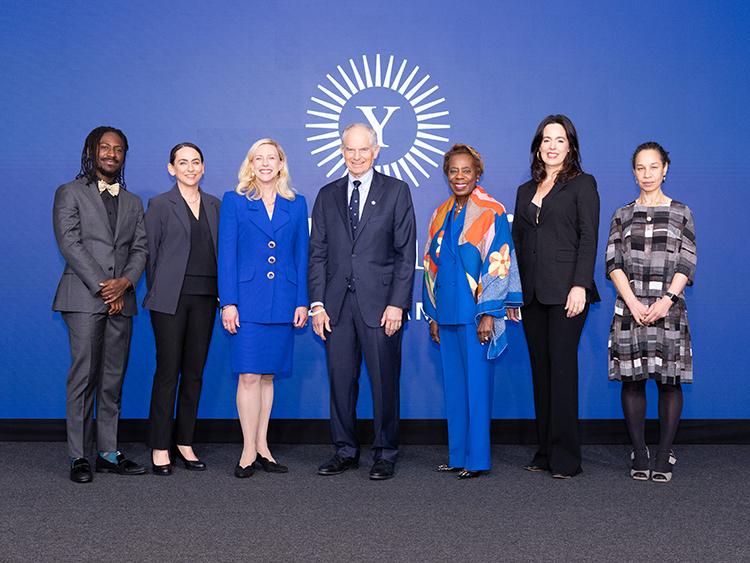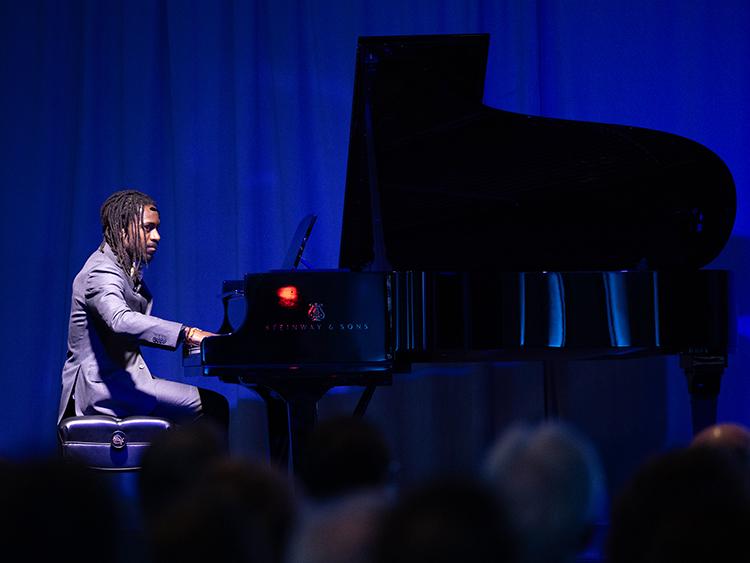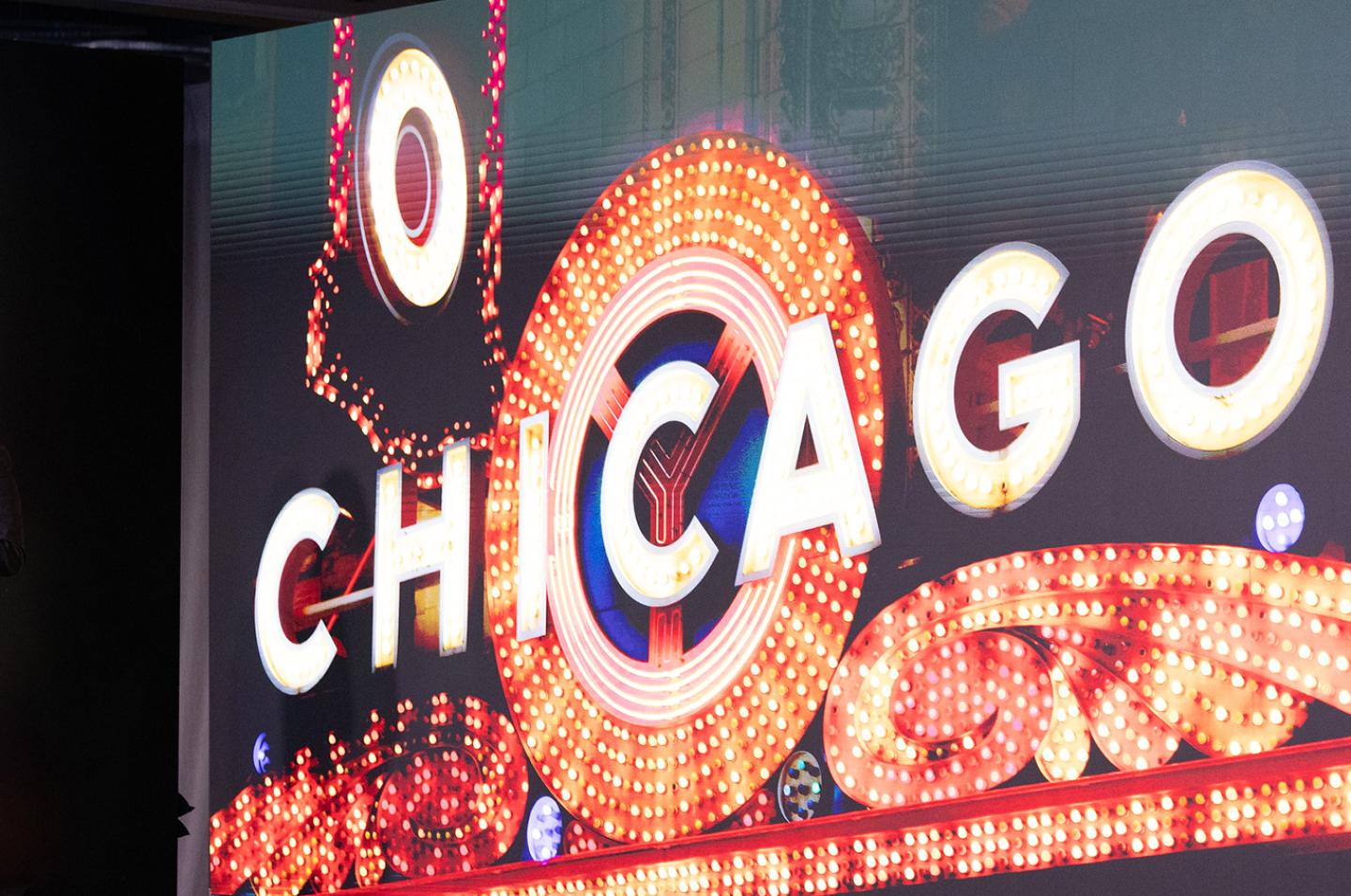On May 8, more than 300 members of the Yale community gathered in Chicago at the Four Seasons Hotel to meet Yale President Maurie McInnis ’96 PhD and hear from Yale faculty and alumni whose work illustrates the impact of the ongoing For Humanity campaign.
After an introduction by university trustees Felicia Norwood ’89 JD and Josh Bekenstein ’80, McInnis took the stage.
McInnis acknowledged the challenges facing higher education: declining public trust, threats to critical funding, and concerns about access, affordability, and free expression. But she emphasized the good that universities can do for the wider world and the need to communicate that good to the public.
“Tonight, I want to shift the focus to what we bring to this country and to humanity and how we can rebuild trust and grow our impact for what comes next,” McInnis said. Discoveries and inventions that came from Yale and other universities are part of our daily lives, she noted, from GPS to the internet and MRI scans to seatbelts.
Higher education’s legacies in the world go beyond scientific and medical innovations, McInnis continued.
“Universities like Yale have also expanded our understanding of humanity,” she said. Pursuits such as art, theater, and historical inquiry “engage us in vital conversations about our society, our culture, and our place in the world. And they can be as powerful, influential, and enduring as any feat of engineering.”
After McInnis’s talk, four featured speakers presented their work, representing the priority areas of the For Humanity campaign: Arts & Humanities for Insight, Science for Breakthroughs, Collaborating for Impact, and Leaders for a Better World.

Alexandra Vazquez: For Performance In and Out of the Classroom
Vazquez, a professor of theater, dance, and performance studies at Yale, uses the arts to analyze and understand the world.
“Performance across the forms can offer experiences that make beautiful demand of our senses, and they can help guide us to the deeper insides of the humanities,” Vazquez said.
She recounted the history of singer and songwriter Sam Cooke, born in Mississippi and raised in Chicago, and played an excerpt of his performance in Miami in 1963.
The performance “gives us alternative maps of Chicago and Miami and how they can make stunning union,” Vazquez said. “Most of all, this recording tells us to never shy away from listening to who and what was here before us.”
By bringing her students to hear live performances in New Haven, Vazquez said, she reminds them of the world outside the classroom, the power of live events, and the communities that can be built through live performance.
Marla Geha: For Basic Science
“Basic science means science that doesn’t have an immediate practical application to everyday life,” said Geha, a professor of astronomy and of physics. Its importance lies in how it paves the way for very practical breakthroughs, from vaccines to Velcro. But, she says, basic science also asks fundamental questions about life and humanity: “Why are we here? How do we get here?”
As an astrophysicist, Geha considers how we got here “at the largest scales,” she said. She explained the overall structure of the Milky Way and the current understanding of how galaxies form: through the merging of smaller galaxies.
Geha also teaches an introductory lecture course for non-science majors. This course inspired her to create a free online course, “Rocket Science for Everyone,” which over 18,000 people have taken so far. She has also helped create the Research Experience for Veteran Undergraduate program, or REVU, designed for alumni of the Warrior-Scholar Project.

AZA Allsop: For Collective Healing
Allsop began with a musical mindfulness moment, playing the piano and narrating a guided meditation while a device scanned his brain waves and displayed them in real time. Allsop, a professor in the department of psychiatry, investigates the physiological connections between music, social behavior, and health.
In his lab, Allsop seeks to understand how tempo, chord progressions, and scales can change the way the brain and heart function to improve mental health.
“Music mindfulness combines elements of music listening with mindfulness practices and may provide synergistic, therapeutic benefits for stress,” he said. Such mindfulness can increase health measures such as heart rate variability and can be an effective treatment for symptoms of anxiety and depression.
Recent research that Allsop conducted involved a collaboration with musicians in the New Haven Symphony Orchestra.
“This sort of innovative work can only be achieved through the relationship between Yale and our New Haven community,” Allsop said. “Through our partnerships, we can meet people where they are and design solutions that are translatable to their actual lived experiences.”

Louise Bernard ’05 PhD: For Cultural Institutions that Empower Communities
Bernard, the director of the Obama Presidential Center Museum, credits her interdisciplinary training at Yale as great preparation for her career. She has taught at Vanderbilt and Georgetown and also returned to Yale, serving as the first curator of prose and drama for the Yale Collection of American Literature at the Beinecke Rare Book & Manuscript Library. She also was part of the team that developed the Smithsonian’s National Museum of African American History and Culture.
“There are different ways to teach, different ways to apply knowledge and to reach wider audiences,” Bernard said.
Bernard often thinks about the “social ecosystem of cultural heritage institutions” that her field often refers to as “GLAM”: galleries and gardens, libraries, archives, and museums.
“Such institutions are committed to sharing research and inquiry, encouraging visitors to see the world in new ways that in turn build empathy and connection with others,” she said.
“As we think about leaders for a better world, I’m hopeful that we will all play our part in supporting and advocating for these third spaces: places outside of home and work that are crucial elements in the social infrastructure.”
Emerging Even Stronger
In her closing remarks, President McInnis reiterated the importance of universities and the unprecedented threats they are facing.
“Now is the time to support Yale and higher education,” she said. “Support the teachers who enrich minds and help us make sense of our complex world. Support the staff who keep our campus running. Support the students who keep our future bright. Because with your support, we can weather any storm—and emerge even stronger.”
